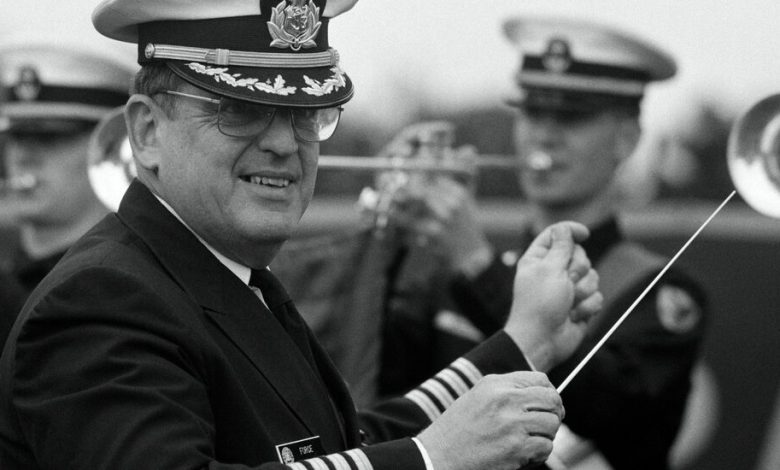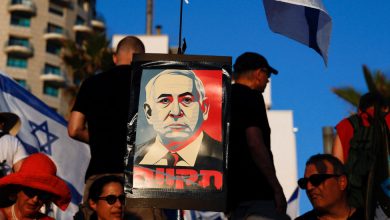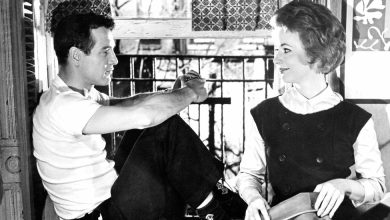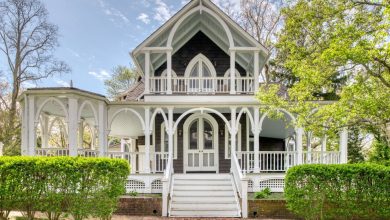Kenneth Force, the ‘Toscanini of Military Marching Bands,’ Dies at 83

Kenneth Force, who as the leader of the Merchant Marine Academy Regimental Band from 1971 to 2016 was one of the nation’s foremost experts in the art of military pomp, died on Oct. 7 in Rye, N.Y. He was 83.
A former student of his, Marianne Lepre, said the death, at a long-term nursing facility, was caused by respiratory failure brought on by chronic obstructive pulmonary disease.
Military music arose historically as a means of communicating orders to troops, but it has long since become a ceremonial custom, with trumpet-tooting and drum-rolling tunes like “Hail to the Chief” and “The Red, White and Blue.”
A military man might say that Captain Force exerted full-spectrum dominance over this territory.
At one time or another, he conducted the U.S. Marine Corps Band, which performs for the president; the band of the Black Watch, a Scottish infantry battalion; the bands, in Britain, of Her Majesty’s Grenadier Guards, Welsh Guards and Royal Marines; and the Dutch Royal Military Band.
He performed at 10 presidential inaugurations, from Dwight D. Eisenhower’s to George W. Bush’s.
“It’s not likely anyone is keeping score,” Peter Applebome of The New York Times wrote in an Our Towns column in 2009, “but there can’t be too many people who have participated in more inaugurations than Captain Force, now 68 and something of a Toscanini of military marching bands.”
He earned that distinction principally as director of music at the Merchant Marine Academy at Kings Point, N.Y., on Long Island. His band members were not aspiring musicians; they were midshipmen training to receive Bachelor of Science degrees, U.S. Coast Guard licenses and officers’ commissions. At inaugurations, the student musicians got to play while marching past a presidential reviewing stand.
“I always tell the midshipmen that you will never forget the memory of passing the president of the United States,” ” Captain Force told The Times.
At each inauguration, his band blared the classic 19th-century song of the marines, “A Life on the Ocean Wave.”
“What we do doesn’t change,” he said. “In many ways we’re a walking museum, something from another age.”
Captain Force kept tradition alive in several ways. He rearranged old band tunes for modern instruments — work he compared to repairing antiques — and he composed new political homages, including “First Lady March” and “Presidential Pets March” (which includes barks and meows).
He and his band were sought after by organizers of great American events. They played at Miss America pageant parades, atop the Brooklyn Bridge for its 100th anniversary, on the field during World Series, on the courts of the U.S. Open after 9/11, and aboard the ocean liner Queen Elizabeth 2 when it carried World War II veterans to Normandy in 1994 for the 50th anniversary of D-Day.
In 1989, The Times credited Captain Force with making his band sound like “a giant walking organ.”
Kenneth Richard Force was born on March 24, 1940, in Queens, where he grew up, to Alvina and George Force. His father was a banker.
Ken got his musical training playing trumpet in the Radio City Music Hall Orchestra, in Broadway pit bands and in the band of the Ringling Bros. and Barnum & Bailey circus.
His fascination with military music dated to one night in 1959, when he was in the First Army Band, headquartered on Governors Island in New York. His bandmaster instructed the group to play louder than usual, since three British bands were coming to visit. They began blasting away on “Colonel Bogey on Parade.”
Over the din, Captain Force clearly heard a British drum major shout, “By the cen-terr! Quick march!”
Then a band of Royal Marines appeared in pith helmets, each stomp of their marching feet clearly audible.
Captain Force was in awe, he later told The Times. He asked a British band director if he had a manual.
“Manual?” the man responded. “It’s 300 years of tradition!”
Captain Force received a bandsman’s diploma from the U.S. Naval School of Music in Washington in 1958, a bachelor of music degree from the Manhattan School of Music in 1964, and a master’s degree from the same institution the next year. He wrote his master’s thesis on British military bands.
On one occasion, in the late 1990s, he waged a battle that united his passions for military music history, preservation and teaching.
He had long considered “Over There,” George M. Cohan’s ode to the American doughboys of World War I, the second-best patriotic song of the 20th century, behind only Irving Berlin’s “God Bless America.” As it happened, Cohan’s former home, where he had written “Over There,” lay just a few minutes away from the Merchant Marine Academy — but the old mansion was about to be demolished.
Captain Force began what Newsday in 1999 called a “zealous campaign” to have Cohan’s home designated a landmark.
“If you tear down the house, you’d be tearing down part of the soul of America,” he told The Times the same year.
He had the midshipmen play “Over There” in view of people filing into a local landmarks commission hearing, and he inspired his students to show up at meetings to espouse his cause.
They saved the property.
“Now I can take my kids here someday when I come back for homecoming,” Lester J. Snyder, a senior from Illinois and a midshipman trumpeter, told The Associated Press shortly afterward. “I’ll be able to share this with the next generation, and maybe they will get to know something about the feeling of duty and honor to your country.”
Captain Force’s three marriages ended in divorce. He is survived by a stepson, John Uribe, and two step-grandchildren. He lived on the grounds of the Merchant Marine Academy for decades and in recent years lived in an apartment across Long Island Sound in Port Chester, N.Y.
Captain Force generally did not criticize United States leaders in public. But he did make an exception for Jimmy Carter’s decision in 1977 to abjure the traditional pomp of an inauguration parade by walking along Pennsylvania Avenue rather than riding in a limousine.
“I know he didn’t want ruffles and flourishes and ‘Hail to the Chief,’” Captain Force told The Times in 2009. “He said it was too pompous. And the country didn’t like that. People think the president deserves special music.
“People like ceremony,” he continued, “and no one does it better than a band. When you lose your ceremony, you lose a lot.”




